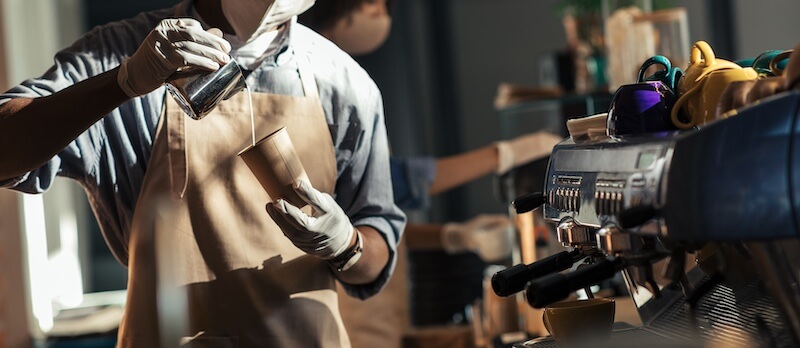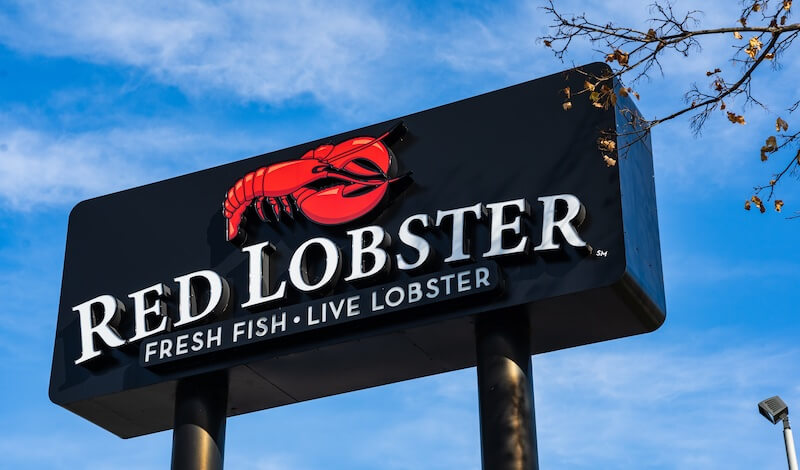When tech companies interview prospective job candidates, they’re probably not asking if that candidate has previously been employed by Applebee’s, Starbucks, or McSorley’s Old Ale House. But the soft skills that the service industry demands means that candidates with such experience will bring with them a surplus of empathy, patience, and creative thinking.
Why is now a good time to talk about this?
Well, it’s a challenging era for restaurants. As Nation’s Restaurant News reports, the Bureau of Labor Statistics’ November 2021 report shows “people are quitting foodservice in droves,” with “quit rates for the accommodation and foodservice industry [growing] from 4.8% to 6.9% over the past year, a larger jump than any other sector listed.”
Makes sense. Restaurant and service jobs are notoriously punishing, and having to tend to pandemic-enraged customers—all while potentially risking one’s health—doesn’t sound too thrilling.

These employees are quitting and going… somewhere. Doubtlessly some disgruntled waiters, bartenders, and baristas will simply find new (hopefully better) gigs in the industry.
But this also means that there’s a growing pool of charismatic, talented individuals who might thrive in an entirely new career—if they’re given the chance.
There is no better project manager than a former restaurant manager…. Smart people are struggling to get jobs in a world that wants us to believe that there aren’t employable candidates left. You’re wearing sunglasses inside and complaining that you can’t see.
Lauren Howard, via Linkedin.
Open your mind as to what qualifies as “qualifications”
Different hiring managers approach a candidate’s resume and qualifications in different ways. Maybe a lot of weight is placed on personal references. Or recent job experience. Or particular skills.
If it’s an entry-level job, perhaps the focus is on where the candidate went to school, and that institution’s reputation.
Don’t get me wrong: College is great. For many people, it’s actually an opportunity to learn and evolve, rather than simply a four-year binge-drinking odyssey. I went to a state school, Rutgers University, and I feel lucky to have the growth experience I did.
But I also spent many concurrent (and post-collegiate) years working at Red Lobster, a nationwide seafood chain best known for its “Ultimate Feast.”

And it was there that I got a very different sort of education—all about how to multitask, manage stress, meet deadlines, process new information, deal with rejection, master new technologies, and engage empathetically and calmly with total strangers.
When I’ve applied for a corporate job over the past decade, I’ve never included my time at Red Lobster on my resume.
But that experience shaped the person I’ve become—arguably more so than the college years I spent reading great novels and memorizing (then forgetting) key moments in American history.
After college, but prior to joining Lemonade, I spent ten years as an arts journalist. Who’s to say that the qualities that role required—an ability to talk to people, juggle assignments, hustle for gigs, and look at things closely from multiple perspectives—weren’t nurtured by Red Lobster as much as they were by Rutgers?
Every brand has customers, whether you’re serving pizza or life insurance
The obvious service-industry-to-tech pipeline might make you think of your company’s Customer Experience team. And indeed, that’s an area where the customer-centric skills a waiter or barista brings with them might be especially applicable.
After all, waiters and baristas help customers through their journey, including navigating any pain points. CX professionals do much the same, even if the product in question is homeowners insurance.
But it doesn’t take much imagination to see how the qualities that make an astounding team member in the service sector would translate into many other roles, including those well outside of CX. (Others have noted, rightly, that the retail industry offers a similar “boot camp” for professional growth, and that bartending is a great training ground for sales pros.)
“Life,” CX Director Rachel Newman adds, “creates great people. There’s a lot to be said for lived experience.” As she notes, Lemonade CX employees have made lateral moves into other departments, including Growth, Marketing, Creative, Content, and Underwriting.
Let’s take a closer look at some of the ways in which a background in the service industry can translate into success in many aspects of tech.
Low EQ need not apply
If you’ve written a job posting in the past 5 years, it has doubtlessly included a mention of “high EQ” or “emotional intelligence.” Overused to the point of cliche, it’s the kind of squishy thing—like “stellar communication skills” and “ability to multitask”—that nearly all job-seekers will claim to possess.
While the typical college experience might boost EQ, there’s plenty of reason to think that a job as a waiter or barista is even more of a proving ground for emotional intelligence. Simply put, a restaurant or coffee shop is a pressure cooker of conflicting personalities, demands, deadlines, and desires.
Can mixing cocktails sharpen PR skills?
Natalie Gerke is Lemonade’s Senior Manager of Media Relations, and she has a B.A. with a focus in public relations. But long before that she worked in service: a sports bar in Gainesville, Florida; courtside server for the Orlando Magic; a high-end steakhouse in Los Angeles.
She cites three key skills that every restaurant veteran learns:
- Time management
- Prioritization
- Customer relations
“The beauty of these skills is that they can be applied to just about any job, regardless of the level,” Gerke says.
“Executive VP, CX coordinator, social media manager, it applies to everyone. The one consistency I’ve seen across the roles and clients I’ve worked with in the PR space is what I learned early on in restaurants. Every day will be different (time management). Every executive and client will have their own personality (customer relations). And every task will be important in some way (prioritization).”
Would you like a side of UX with that?
Jed Baker is Lemonade’s UX and Product Writing Lead. That means he spends his day ensuring that our brand voice (and that of our helpful bots, Maya and Jim) is cohesive and delightful.
He also, incidentally, has a B.A. in theater and an M.A. in folklore. But along the way, he put in many hours in the service industry—as a waiter in Stowe, Vermont, a barista at Java Joe’s and Starbucks, and a bartender in Newfoundland.
You might assume that Baker’s service industry background has had zero impact on how he crafts microcopy, but you’d be wrong.
Bartending and waitering gave Baker “a deeper understanding of empathy and teamwork, a respect for the concept of service, [experience] problem-solving, and a deeper capacity for listening,” he says.
“When waiting tables or making espresso drinks or mixing cocktails,” Baker adds, “you’re on one side of a transaction that involves a transfer of information and trust.
“Every service industry job I’ve ever had drove home the dynamics of a two-sided interaction, where one side has something the other side wants. That interaction is the best it can be when both sides are listening and understanding and respecting each other. It’s true in the service industry, and it’s true in UX writing. To do a good job, you need to be able to put yourself in the shoes of the people on the other side.”
Real diversity and inclusivity
Less remarked upon when discussing the education a service industry job provides, perhaps, is how refreshingly diverse a restaurant or cafe’s staff tends to be. (Granted, it’s certainly not all sunshine and puppies, and there are sometimes unfortunate disparities between front- and back-of-house staffs.)
There’s no “typical” service industry employee, and that’s part of what makes working at a restaurant or cafe so refreshing and unexpected.
During any given shift, your co-workers might include a PhD who’s tending bar while chipping away at their dissertation; a single mom picking up occasional nights; a struggling musician with a GED; and a South American immigrant who’s patient enough to suffer through everyone else’s lame attempts at Spanish.
Whereas it might be an unconscious inclination to cling to “people like yourself” at college, or within a less diverse corporate setting, trying to do so within the service industry would be laughable.
So let’s recap:
- An easy acceptance of diverse viewpoints?
- The ability to work closely with those who you might otherwise never cross paths with?
Sounds like qualities that would benefit any organization, especially one struggling to break free of its own echo chambers.
Valuable experience—even if it’s far in the past
Many of the Lemonade team members we chatted with above didn’t come to the tech sphere directly from the service industry. But it’s clear that their experience as waiters, baristas, or bartenders—even if it’s a decade old, and not cited on their resume—imparted vital skills that they continue to leverage in their roles.
“The skills I learned in the service industry have stayed with me. I have a weird amount of patience for very specific problems. I can carry tons of info in my head without going crazy. Noise doesn’t bother me, and stressful situations don’t really stress me out.”
Adina Eckstein, Lemonade’s COO (and former coffee shop, sushi restaurant, and steakhouse employee)
We’re not suggesting that you lurk outside your favorite restaurant, recruiting disgruntled waiters as they clock out for the night.
But it could make sense to introduce a conversation about prior service industry experience into your interview toolbox. Why not ask a prospective publicist, copywriter, or art director if they’ve ever waited tables—and, if so, how that experience molded the way they think about creativity, collaboration, and thriving under pressure?